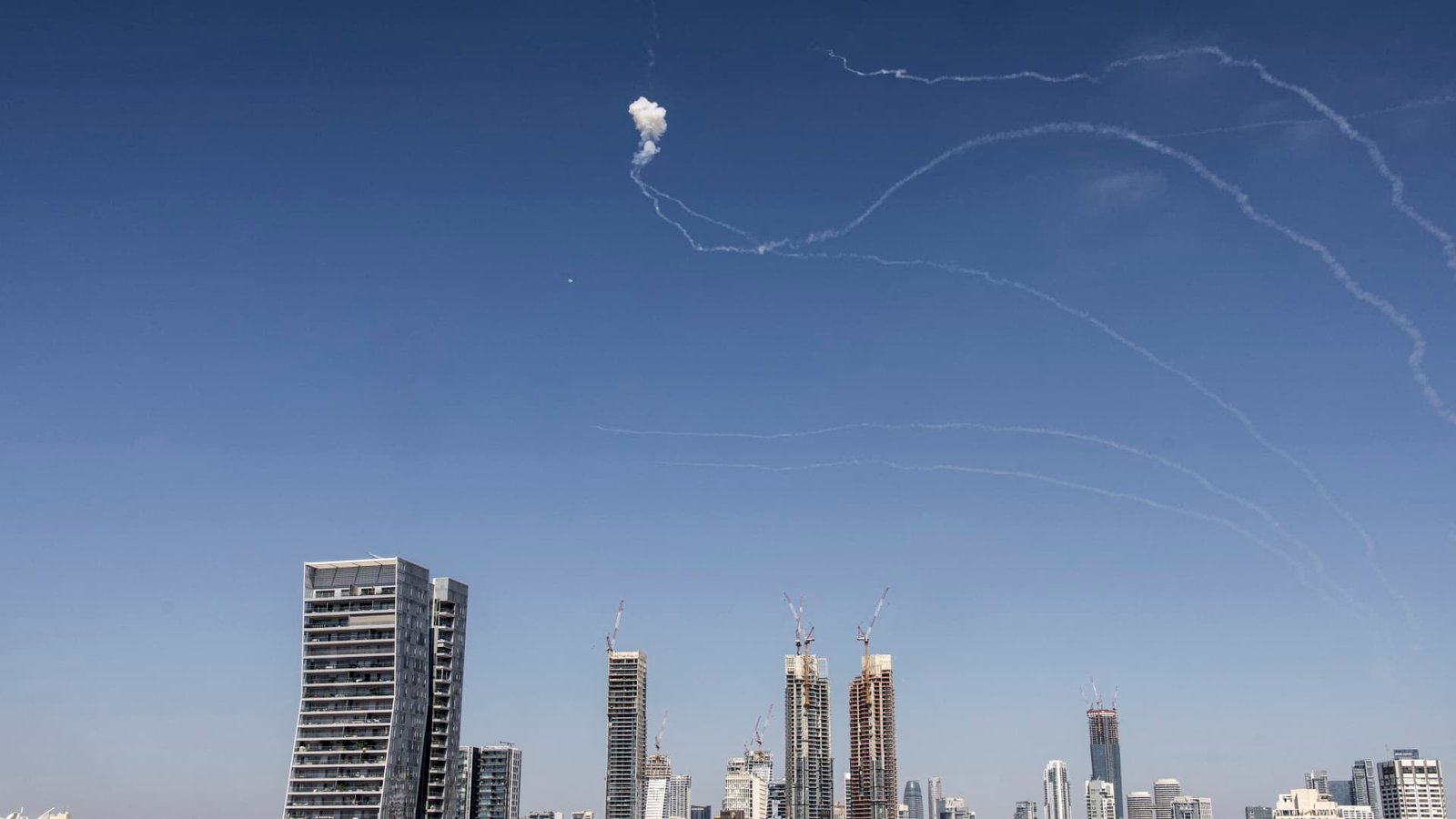A missile is intercepted over Tel Aviv on June 20, 2025, after a Iran fired a fresh salvo of missiles.
John Wessels | Afp | Getty Images
Iran and Israel exchanged fresh attacks early on Saturday, a day after Tehran said it would not negotiate over its nuclear programme while under threat and Europe tried to keep peace talks alive.
Iran’s Fars news agency said Israel had targeted the Isfahan nuclear facility, one of the nation’s biggest, but there was no leakage of hazardous materials.
Iranian media also said Israel had attacked a building in the city of Qom, with initial reports of a 16-year-old killed and two people injured.
The Israeli military said it had launched a wave of attacks against missile storage and launch infrastructure sites in Iran.
Shortly after 2:30 a.m. in Israel (2330 GMT on Friday), the Israeli military warned of an incoming missile barrage from Iran, triggering air raid sirens across parts of central Israel, including Tel Aviv, as well as in the Israeli-occupied West Bank.
Interceptions were visible in the sky over Tel Aviv, with explosions echoing across the metropolitan area as Israel’s air defence systems responded.
Sirens also sounded in southern Israel, said Magen David Adom, Israel’s national emergency service.
An Israeli military official said Iran had fired five ballistic missiles and that there were no immediate indications of any missile impacts. There were no initial reports of casualties in Israel.
The emergency service released images showing a fire on the roof of a multi-storey residential building in central Israel.
Local media reported that the fire was caused by debris from an intercepted missile.
Disputes on Iran’s nuclear programme
Israel began attacking Iran on June 13, saying its longtime enemy was on the verge of developing nuclear weapons.
Iran, which says its nuclear programme is only for peaceful purposes, retaliated with missile and drone strikes on Israel.
Israel is widely assumed to possess nuclear weapons. It neither confirms nor denies this.
Its air attacks have killed 639 people in Iran, according to the Human Rights Activists News Agency, a U.S.-based human rights organisation that tracks Iran. The dead include the military’s top echelon and nuclear scientists.
In Israel, 24 civilians have been killed in Iranian missile attacks, according to authorities. Reuters could not independently verify casualty figures for either side.
The flag of Iran and other national flags are seen in front of the German Mission to the UN, as foreign ministers from Britain, France and Germany, known as the E3 countries, will meet with an Iranian delegation for talks about Iran’s nuclear program on June 20, 2025 in Geneva, Switzerland.
Sedat Suna | Getty Images News | Getty Images
U.S. President Donald Trump said on Friday he thought Iran would be able to have a nuclear weapon “within a matter of weeks, or certainly within a matter of months”. He told reporters at the airport in Morristown, New Jersey: “We can’t let that happen.”
He said his director of national intelligence, Tulsi Gabbard, was wrong in suggesting there was no evidence Iran is building a nuclear weapon.
Iran has repeatedly targeted Tel Aviv, a metropolitan area of around 4 million people and the country’s business and economic hub, where some critical military assets are also located.
Israel said it had struck dozens of military targets on Friday, including missile production sites, a research body it said was involved in nuclear weapons development in Tehran and military facilities in western and central Iran.
Iranian Foreign Minister Abbas Araqchi said there was no room for negotiations with the U.S. “until Israeli aggression stops”. But he arrived in Geneva on Friday for talks with European foreign ministers at which Europe hopes to establish a path back to diplomacy.
Scant progress in Geneva
Trump reiterated that he would take up to two weeks to decide whether the United States should enter the conflict on Israel’s side, enough time “to see whether or not people come to their senses”, he said.
Trump said he was unlikely to press Israel to scale back its airstrikes to allow negotiations to continue.
“I think it’s very hard to make that request right now. If somebody is winning, it’s a little bit harder to do than if somebody is losing, but we’re ready, willing and able, and we’ve been speaking to Iran, and we’ll see what happens,” he said.
The Geneva talks produced little signs of progress, and Trump said he doubted negotiators would be able to secure a ceasefire.
“Iran doesn’t want to speak to Europe. They want to speak to us. Europe is not going to be able to help in this one,” Trump said.
Ambassador Dorothy Camille Shea, Chargé d’Affaires ad interim of the United States, speaks during a UN Security Council meeting on threats to international peace and security at the United Nations headquarters on June 20, 2025 in Washington, DC.
Michael M. Santiago | Getty Images News | Getty Images
Hundreds of U.S. citizens have fled Iran since the air war began, according to a U.S. State Department cable seen by Reuters.
Israel’s envoy to the United Nations, Danny Danon, told the Security Council on Friday his country would not stop its attacks “until Iran’s nuclear threat is dismantled”.
Iran’s U.N. envoy Amir Saeid Iravani called for Security Council action and said Tehran was alarmed by reports that the U.S. might join the war.
Russia and China demanded immediate de-escalation. A senior Iranian official told Reuters that Iran was ready to discuss limitations on uranium enrichment but that it would reject any proposal that barred it from enriching uranium completely, “especially now under Israel’s strikes”.
#Iran #Israel #launch #attacks #Tehran #rules #nuclear #talks



